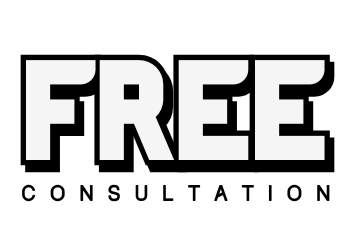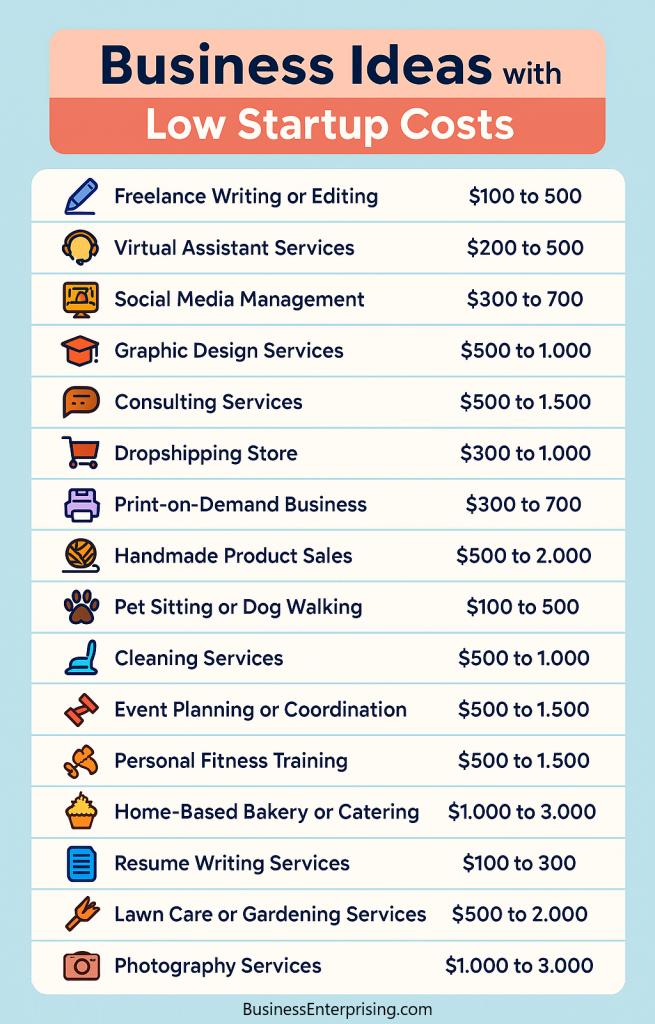 Starting a business does not always require large investments or complex financial plans. Many entrepreneurs successfully launch businesses with low startup costs. These businesses give you the chance to test ideas without significant financial pressure. Therefore, they offer a practical entry point if you’re new to entrepreneurship.
Starting a business does not always require large investments or complex financial plans. Many entrepreneurs successfully launch businesses with low startup costs. These businesses give you the chance to test ideas without significant financial pressure. Therefore, they offer a practical entry point if you’re new to entrepreneurship.
Additionally, the demand for flexible, small-scale businesses has grown in recent years. More people want to start side projects without leaving their full-time jobs. As a result, businesses that require little capital and fewer resources have become popular. You can start these ventures from home, saving money on rent and overhead.
Furthermore, technology has made launching a business easier and cheaper. You now have access to free or low-cost digital tools. These resources help you manage operations, market your services, and reach customers without heavy expenses. Therefore, the barrier to entry is much lower than it was years ago.
However, starting a low-cost business still requires planning and effort. You need to evaluate your skills, interests, and available time. By doing so, you can choose a business model that aligns with your goals. Additionally, you should consider market demand and long-term sustainability.
Many successful businesses started small and grew steadily over time. They focused on providing value while keeping expenses low. Therefore, if you are motivated and strategic, a low-cost business can generate meaningful income.
If you are ready to start, learning about the characteristics and benefits of these business models is helpful. You will also want to understand common tools and resources that can support your efforts. This knowledge can help you make informed decisions and avoid unnecessary expenses.
Understanding Low-Cost Business Opportunities
Starting a business with low startup costs can be a practical path to entrepreneurship. These ventures typically require minimal initial investment, often ranging from a few hundred to several thousand dollars. This affordability makes them accessible if you have limited capital but a strong desire to start your own business.
Low-cost startups often include service-based businesses, online enterprises, and freelancing. Examples are consulting, tutoring, dropshipping, or managing social media for clients. These models usually have lower overhead expenses, allowing you to allocate resources effectively.
The appeal of businesses with low startup costs lies in their reduced financial risk. You can test your business idea without significant debt or large investments. Additionally, these ventures offer flexibility, enabling you to operate part-time while maintaining other income sources. This approach allows you to build your business at a comfortable pace.
Moreover, the potential for a quicker return on investment is another advantage. With lower initial expenses, you may reach profitability sooner, which can be encouraging as you establish your business. This financial efficiency allows you to reinvest earnings into growth and development.
In summary, understanding low-cost business opportunities involves recognizing ventures that require minimal capital, carry less financial risk, and offer flexibility. These factors make them particularly attractive if you’re looking to enter the business world without substantial upfront investment.
Benefits of Starting a Low-Cost Business
Starting a low-cost business offers several advantages that can make your entrepreneurial journey more manageable and rewarding. One significant benefit is the reduced financial risk. With minimal initial investment, you can test your business idea without the burden of substantial debt. This approach allows you to explore entrepreneurship while safeguarding your personal finances.
Additionally, businesses with low startup costs provide remarkable flexibility. You can often operate these ventures from home, eliminating the need for expensive office space. This setup enables you to tailor your work schedule to fit personal commitments, fostering a better work-life balance. Moreover, the ability to start part-time allows you to maintain a steady income from your current job while gradually building your business.
Another advantage is the potential for a quicker return on investment. Lower overhead expenses mean you can achieve profitability sooner, allowing you to reinvest earnings into growth. This financial efficiency accelerates the development of your business and enhances its sustainability.
Furthermore, operating a low-cost business allows you to adapt swiftly to market changes. With fewer financial obligations, you can pivot your business model or offerings as needed to meet evolving customer demands. This agility is invaluable in maintaining a competitive edge in today’s dynamic marketplace.
In essence, starting a low-cost business minimizes financial exposure, offers operational flexibility, and facilitates a faster path to profitability. These benefits make it an appealing option if you’re looking to enter the business world with limited resources and maximum adaptability.
Common Characteristics of Low-Cost Business Models
Starting a business with minimal upfront investment is appealing if you’re looking to enter the entrepreneurial world without significant financial risk. Businesses with low startup costs often share common characteristics that make them accessible and manageable.
One prevalent trait is adopting a digital-first model. By leveraging online platforms, you can reach a broad audience without the expenses associated with physical storefronts. For instance, launching an e-commerce store or offering digital services allows you to operate entirely online, reducing costs related to rent and utilities.
Additionally, service-based businesses typically require less capital to start. Utilizing your existing skills in areas like consulting, graphic design, or writing enables you to begin with minimal equipment and resources. This approach focuses on providing expertise directly to clients, eliminating the need for substantial inventory or manufacturing expenses.
Furthermore, maintaining low overhead operations is essential. Operating from a home office or utilizing co-working spaces can significantly reduce expenses. By keeping fixed costs low, you can allocate more resources to growth and development.
Moreover, focusing on niche markets can enhance cost efficiency. Targeting specific customer segments allows you to tailor your offerings and marketing efforts, often resulting in higher conversion rates and customer loyalty. This strategic focus can lead to more effective use of limited resources.
Businesses with low startup costs often embrace digital platforms, leverage personal expertise, and maintain lean operations. These characteristics enable you to minimize initial investments while maximizing potential for growth and success.
Examples of Successful Low-Cost Business Ideas
Exploring low-cost business ideas can open doors to entrepreneurship without requiring significant capital. Several ventures allow you to leverage existing skills and resources, making them accessible and manageable.
Freelance services offer a flexible path to self-employment. If you have expertise in writing, graphic design, or programming, you can provide these services to clients remotely. This approach requires minimal investment, primarily a reliable computer and internet connection.
Online stores present another viable option. By utilizing e-commerce platforms, you can sell products ranging from handmade crafts to curated vintage items. This model allows you to reach a broad audience without the overhead costs of a physical storefront.
Consulting enables you to monetize your professional experience. Whether in business strategy, marketing, or another field, offering tailored advice to organizations can be both rewarding and cost-effective. Your primary investment is your accumulated knowledge and networking efforts.
Tutoring is a fulfilling way to share your academic strengths. Providing guidance in subjects like mathematics, languages, or science can be done in person or online. This flexibility allows you to accommodate various schedules and client needs.
Dropshipping offers an e-commerce solution without the need to manage inventory. By partnering with suppliers, you can market and sell products directly to consumers. The supplier handles storage and shipping, reducing your operational responsibilities.
Additionally, pet services such as dog walking or pet sitting cater to the needs of busy pet owners. This business requires minimal equipment and can be tailored to your availability.
These examples highlight the diversity of businesses with low startup costs. By focusing on your skills and market demand, you can establish a successful venture with minimal initial investment.
Essential Tools & Resources to Start on a Budget
Launching a business on a tight budget is achievable with the right tools and resources. By leveraging affordable or free solutions, you can effectively manage various aspects of your operations without compromising quality.
For website building, platforms like Wix and Squarespace offer user-friendly interfaces with customizable templates. These services allow you to create professional websites without extensive coding knowledge. Additionally, both provide free plans with basic features, making them ideal for businesses with low startup costs.
In the realm of marketing, tools such as Canva enable you to design compelling graphics for social media and promotional materials. Its intuitive drag-and-drop functionality and extensive library of templates make it accessible, even if you lack design experience. Moreover, email marketing platforms like Mailchimp offer free tiers that allow you to manage mailing lists and automate campaigns, enhancing your outreach efforts.
To streamline operations, project management tools like Trello provide a visual approach to organizing tasks and collaborating with team members. Its card-based system allows you to track progress and deadlines efficiently. Furthermore, communication platforms like Zoom facilitate virtual meetings, enabling seamless interaction with clients and colleagues, regardless of location.
For financial management, Wave offers free accounting software tailored for small businesses. It assists in tracking income and expenses, invoicing, and even payroll services. This comprehensive tool ensures you maintain financial clarity without incurring additional costs.
By integrating these tools into your business operations, you can maintain professionalism and efficiency while keeping expenses minimal. This strategic approach allows you to allocate resources more effectively, fostering sustainable growth from the outset.
Tips to Maximize Success Without a Big Budget
Starting a business on a limited budget requires strategy, creativity, and smart decision-making. You can build success without large financial resources. By focusing on resourcefulness, you can overcome many common startup challenges and grow your business efficiently.
One of the best ways to maximize success is to leverage free marketing strategies. Social media platforms offer powerful tools to reach your target audience at no cost. Additionally, you can engage with local community groups or online forums to promote your products or services. This direct interaction often leads to valuable connections and new customers.
Networking is another cost-effective strategy you should use. However, building relationships takes effort and consistency. Attend local events, join business groups, or connect with entrepreneurs online. These relationships can open doors to new opportunities, referrals, and partnerships.
Additionally, creativity plays a significant role in growing businesses with low startup costs. You should look for unique ways to promote your business without spending heavily. For example, you can collaborate with other small businesses for joint promotions. This approach expands your reach while sharing marketing expenses.
Budgeting wisely is essential to long-term success. Therefore, you should track every expense and identify areas where you can cut costs. Many free or low-cost tools can help you manage your finances and stay organized. By keeping overhead expenses low, you will have more flexibility to reinvest profits into growth.
Furthermore, always focus on providing value to your customers. Happy customers often become loyal advocates and share their experiences. This word-of-mouth marketing helps build your business without additional costs.
Ultimately, by using creativity, networking, and careful budgeting, you can thrive even with limited resources. Many entrepreneurs have successfully built businesses with low startup costs by following these practical strategies.
Conclusion
Starting a business doesn’t have to drain your savings or require heavy funding. Businesses with low startup costs give you a way to start small and grow over time. They allow you to test your ideas with less financial pressure, which can help you gain confidence and experience.
Additionally, many of these businesses can be run part-time, giving you the option to maintain another source of income. This flexibility is especially helpful if you’re managing other responsibilities or trying to minimize financial risk. It also gives you more control over how fast you scale your operations.
Furthermore, you can use affordable tools and platforms to keep your overhead low. From website builders to accounting apps, these resources support your business without adding unnecessary costs. With the right approach, you can build a strong foundation using only essential expenses.
However, success still depends on your consistency and the value you provide. Even low-cost businesses require time, planning, and effort to grow. You’ll need to market effectively, manage your operations, and stay focused on your goals.
If you’re considering launching your own business, this path can be a smart way to start. By staying lean and strategic, you increase your chances of long-term success. The best part is that you don’t need to wait for perfect conditions to get started. Therefore, take time to explore your options, assess your strengths, and choose a business model that fits your goals and resources.



